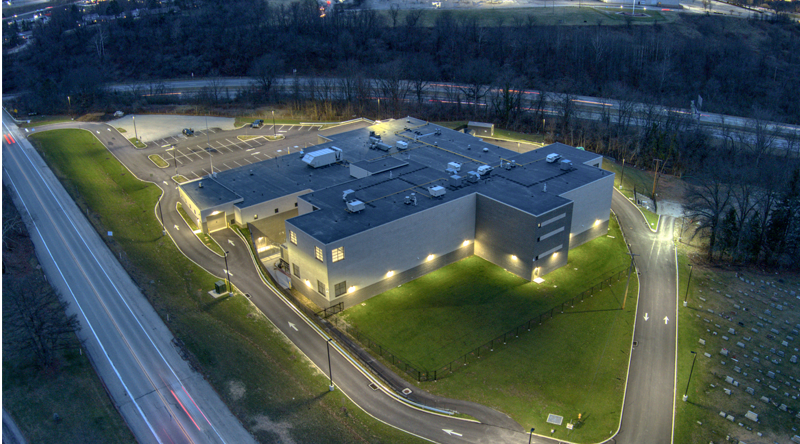New County Jail in PA Increases Safety and Creates New Rehab Standard

By David McRoberts and Renee Schoop
Fayette County, Pa., recently completed its new Fayette County Jail, located in the City of Uniontown—its county seat—replacing the town’s existing 130-year-old facility.
The Need for a New Facility
The existing jail opened in 1892, with additions completed in 1999. More than 20 years later, the jail had outgrown its capacity of 262 inmates and was regularly forced to lease additional bed space from other counties. As the building aged, it became more costly to maintain, and Fayette County officials determined it was time to construct a new jail to address those issues head-on.
“While it’s never popular to build a new jail, it was much needed given the age and condition of the existing facility; and what people forget sometimes is that our employees work inside those walls, so we are improving their work environment, as well,” Commissioner Scott Dunn said.
Planning, Design, and Construction
Fayette County selected TranSystems Corporation (TranSystems) to oversee the planning and concept design services, followed by the full design of the new jail, including plans and specifications. Once construction was underway, TranSystems provided construction administration services.
“We demanded quality work to meet exacting standards. TranSystems not only met, but exceeded, those standards,” Commissioner Chairman Dave Lohr said. “Their decades of combined experience, professionalism, and boundless creativity make TranSystems one of Pennsylvania’s leading architectural and engineering firms.”
Additional design and construction partners included McFarland Kistler & Associates – Food Service and Laundry Design, Professional Systems Engineering – Security and Telecommunications, Maser Consulting and McMillen Engineering – Site/Civil Engineering and Permitting, and SiteLogIQ – Construction Management, and Nello Construction – General Trades Construction.
Located on the site of the former U.S. Army Reserve Training Center, the property was acquired by the County from the federal General Services Administration (GSA), the existing buildings were demolished, and extensive site work was completed to prepare for the new 112,250-sq. foot, 170-cell, 330-bed jail. To meet future capacity needs, the jail was designed to accommodate an additional 68 cells or 132 beds.
State-of-the-art safety features were added to increase safety, reduce operational costs, and create a positive impact for all who are incarcerated and those who work there. These include:
- separate staff entrance
- infrastructure for body scanners to eliminate contraband
- electromechanical sliding doors (as opposed to swing doors)
- additional areas of segregation and specialty spaces to support the totality of programmatic offerings and community re-entry to the inmate population
- enhanced design features to eliminate “blind spots,” creating clear sight lines
- implementing active and passive security provisions, including the exterior facility wall functioning as the secure perimeter
- specially designed holding cells for increased safety for those inmates suffering a substance use and or mental health crisis
The new jail also features precast concrete cells, flexible housing, the Direct Supervision Management Model, and enhanced amenities for officer training.
Completed in February 2024, the facility meets current demands while also fulfilling the long-term interests of Fayette County.
“We worked diligently to come up with a solid plan; a plan that fit our financial parameters while meeting the needs of staff and inmates alike; a plan that would stand the test of time for years to come. That’s what’s exciting,” Lohr said. “It’s been a painstaking process with attention paid to every detail. It’s really teamwork at its finest and a great example of what Fayette County is capable of.”
Rehabilitation and Re-Entry with I.G.N.I.T.E.
Treatment space, inmate education, and rehabilitation remained at the forefront of decision-making throughout the planning and design stages.
“The citizens of Fayette County can be assured that their criminal justice system now has a new prison facility that can administer programs to inmates that can help rehabilitate them for the future,” Commissioner Vince Vicites said.
Throughout his time in Fayette County, Sheriff James Custer has witnessed generational incarceration, meaning more than one generation of family members repeatedly enters the justice system. Aiming to break that cycle and utilize the increased capacity and flexible spaces of the new Jail, the County launched an exciting new program with great results so far across multiple other states. The first of its kind in Pennsylvania, I.G.N.I.T.E., Inmate Growth Naturally & Intentionally Through Education, intends to provide not only education and opportunity but also hope to incarcerated individuals as they prepare for reintegration.
“This program is not just a program; it’s a culture change,” Sheriff Custer said.
The program started in 2020 in Genesee County, Michigan, under Sheriff Chris Swanson and was later adopted by the National Sheriff’s Association, is designed around meritocracy and evidenced-based results. Those who participate in the program receive special distinctive uniforms and earn personal visitation or other rewards. In a County Jail where the Average Length of Stay can range from just days to 23 months, the program focuses on both short-term and long-term education.
Warden John Lenkey said, “The new jail has the capacity to provide services and tools that will afford the inmates an opportunity to leave here a better person than they arrived. We’re going to try to make a difference with not just one, not just a few, but the many.”
Each inmate who participates in the program has access to a tablet and password. Their log-in stays with them even after they are released so that they may continue their rehabilitation. Fayette County utilizes Edovo, which provides a formal, structured, and varied curriculum.
Upon completion, they will graduate at a ceremony with their peers and family members.
Fayette County provides financial literacy education, Serve Safe training for the food industry, General Education Development (GED), janitorial training, as well as job application and interview preparation support. The County Jail also collaborates with local businesses and entities such as local banks and school districts.
The Jail’s new broadcast system keeps everyone informed and helps inmates with their daily routines, including the I.G.N.I.T.E. program.
According to Sheriff Custer, the I.G.N.I.T.E. program has resulted in 95% less inmate-on-staff violence and 95% less inmate-on-inmate violence.
“Morale has improved since moving into the facility. Some officers that were not sure they wanted to operate in the new management model were pleasantly surprised and decided to stay,” said Sheriff James Custer. “We must leave the insanity of the past behind us and move forward with this new standard in corrections. The investments we make with these individuals while they are incarcerated will pay dividends when they return to the community.”
“We don’t want to be A standard. We want to be THE standard,” said Warden Lenkey.
To learn more about the Fayette County Jail and to follow the progress of I.G.N.I.T.E., visit www.fayettecountypa.org/797/Fayette-County-Prison-Project.
David McRoberts, CPP, is a retired Sheriff’s Department Captain and large jail facility administrator now working as an independent consultant with Assured Assessments Inc, and a member of the CN Editorial Advisory Board. Renee Schoop serves as a Business Development Manager for TranSystems.
Editor’s Note: This article originally appeared in the May/June 2024 issue of Correctional News.





